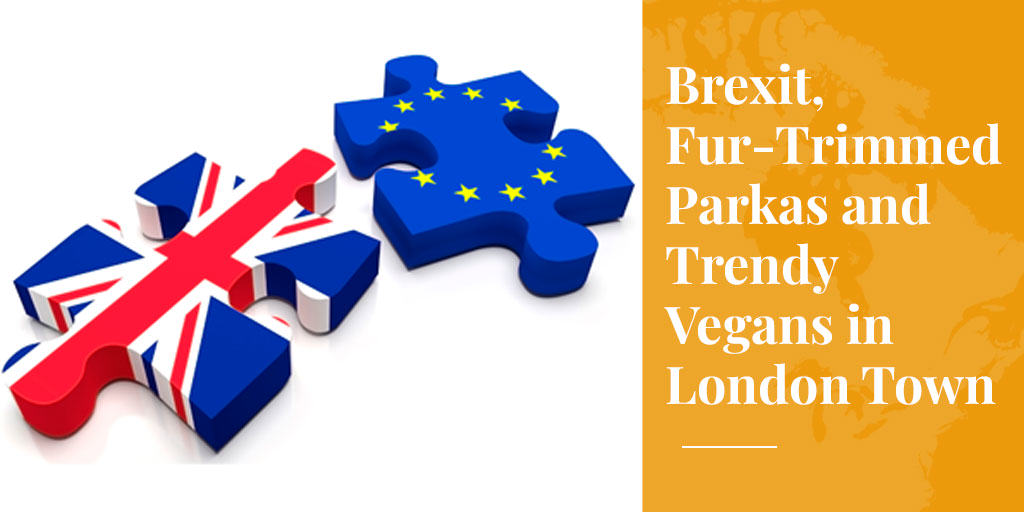
A recent trip to the United Kingdom allowed me to conduct some unscientific research on common preconceptions about this damp and chilly nation. Are the natives really as fixated on Brexit as media reports suggest? Is opposition to fur as strong as we’re told? And is veganism truly sweeping the land?
The UK is the spiritual home of the animal rights movement, so it’s not surprising that it also hosts some determined anti-fur campaigners. In 2000, England was the first country to prohibit fur farming (largely symbolic because there were so few farms), and now activists want to ban all fur imports. To this outside observer, the future of fur in the UK was looking grim before my recent visit. Now, I’m a little more optimistic.
OK, I’m not strictly an outsider. I’m English. But I’ve spent almost no time there for 20 years, so a month-long stay over Christmas gave me the chance to see whether my preconceptions based on media reports and hearsay matched reality.
As my plane touched down at London Heathrow on a dark and foreboding 4°C evening, my main preconceptions, of course, concerned Brexit. Did people really talk about nothing else? And, more to the point, was it fair to say that mere mortals could make no sense of this complex mess?
In close second place was my preconception about the likelihood of some sort of fur import ban. A campaign to this end got a lot of media coverage last summer, buoyed by a bevy of celebrities and stories of fur-vendors and wearers being harassed on Instagram. The Conservative government nixed the idea of a ban, but the main opposition party, Labour, was unsurprisingly more receptive, and with the political scene in turmoil (Brexit, again!) who knows what could happen?
My third preconception was that all the stories I’d been reading about veganism sweeping the UK must be exaggerated. Omnivores like myself tend to believe that veganism can never become a major trend, but what if we’re wrong? Ethical vegans (as opposed to the dietary variety who just think veganism is healthy) tend to share animal rights beliefs, so if vegan numbers were really swelling, the UK might become less fur-friendly than ever.
It was time for some first-hand observations.
Fur-Trimmed Parkas Everywhere
My first objective was to see for myself how much fur was on the street.
This totally informal survey took in two quite different areas: London’s West End, with all its foreign and often well-heeled tourists, and a sampling of towns and villages across the county of Kent. From growing up in the region, I expected to see a smattering of mink and fox jackets in London, but very little in the way of full-fur garments elsewhere. And I was right. The southeast of England has never been a big fur market.

But here’s the news! Everywhere I turned, from London’s ritzy Piccadilly Circus to the tiny village of Downe, Kent, where my parents live, fur-trimmed parka hoods were everywhere. Trendy folk were wearing them, but so too were school kids, pensioners with grocery bags, and tough guys with workman boots. In an impromptu high-street survey in the coastal town of Folkestone, I estimated half of all Christmas shoppers were wearing them.
So you’re asking were they real or fake, and yes, the majority looked cheap and ill-kempt, and were almost certainly plastic. But as many as one in 20 looked spectacular, meaning top-notch fakes or real, and at least one in 50 was bona fide coyote. I don’t think that’s insignificant, especially in England at a time when animal activists are constantly claiming that real fur is taboo. They’re wrong.
I saw no disapproving looks from passers-by at those sporting coyote, and I don’t believe that’s because anyone thought they were fakes. It’s not that hard to spot a real coyote ruff, particularly when it’s accompanied by a helpful Canada Goose logo. Rather, I imagined the wearers of cheap fakes were admiring the real McCoy enviously, wishing they could afford one of their own.
I don’t know whether this boom in fur-trimmed parkas will open the door to other furs (and shut down talk of fur bans for good), but it is clear that the look of fur – both fake and real – is now hugely popular and widely accepted in the UK. It was certainly a surprise that media reports had not prepared me for.
Fashionable Vegans

Gauging the popularity of veganism was another kettle of fish (to use a phrase PETA would rather we didn’t). I just kept my eyes and ears open, and didn’t have long to wait.
Whenever I go home, one of my first stops is my local pub, the George & Dragon, for a pint of bitter, a comforting reminder that no matter where in the world I pitch my tent I will always be English. Imagine my surprise, then, when I asked for a bite to eat and was offered the option of a vegetarian menu! I literally squawked and threw up my hands as if the barman had offered me a virus.
No, I don’t live under a stone and have even seen vegetarian menus in trendy eateries, but a good English pub is never trendy – or so I thought.
I soon learned that British diners are now thoroughly coddled when it comes to their dietary quirks. Many restaurants, stores and, yes, even pubs offer gluten-free vegetarian and vegan options, and a meat substitute called Quorn is all the rage. My own sister served Quorn “meatloaf” on Boxing Day, which I viewed with the same curiosity I normally reserve for unrecognizable roadkill.
For an expert’s analysis, I sat down with my old friend and sheep farmer Lizzie, who, virtue of two teenage daughters, has a finger on the pulse of all things trendy. When she informed me we were now in the month of Veganuary, I knew I was in for an eye-opener.

“Veganism has become terribly fashionable, for many of the wrong reasons,” she said. “The supermarkets have jumped on the band wagon and vegan food is everywhere – actually at the expense of vegetarian food.”
“People are increasingly being told about the damaging environmental effects of livestock production, and they believe that by becoming vegan they are helping to save the planet. But they are unaware that by rejecting meat and dairy products, their dietary fats now come from sources which contribute to the destruction of rainforests. 70% of UK farmland is under grass for very good reasons – agronomic and environmental. We are extremely well-placed in the UK to produce beef and lamb in a sustainable way.”
So are all these vegans also animal rights activists, or at least sympathetic to the cause?
“There are a fair number of ethical vegans here, but only a few of them are animal activists. Most long-term vegans are calm and peaceful – they don’t have the energy to be anything else. However, many of the new trendy vegans don’t really care all that much about animals. It’s more to do with fashion, perceived health benefits, and their own woolly thinking born of a total disconnect with the whole concept of food production.”
And just to prove that Brits can’t stay off the subject of Brexit, she adds: “The one good thing that could have come out of Brexit would be leaving the Common Agricultural Policy. Sadly, we’re going to bugger that up along with the rest of it. I’ll be interested to see how long it takes these misinformed vegans to revert to meat-eaters once the food shortages kick in. I can’t see them living on swede, a few stored potatoes and apples until the summer.”
Unscientific Conclusions
In North America, it is not uncommon for people to write off the British as a bunch of animal-rights fanatics. But, as in all things, we should be cautious about making generalizations about entire cultures, especially when our only sources of information are the media.
With that in mind, I now offer these unscientific conclusions from my recent month of field work.
First, and for me the most fascinating, most Brits don’t seem to hate fur at all, at least not fur-trimmed parkas. This suggests the future of fur in the UK may not be so bleak after all, especially if new products can be developed and marketed that cater to emerging trends and lifestyles.
Second, the overwhelming majority of Brits are still omnivores, but the rise of veganism is very real. However, this may just be a passing phase, and there’s no reason yet to assume that today’s trendy vegans will become tomorrow’s animal rights activists.
And last but most definitely not least, it’s true: just mention the word Brexit and everyone within ear-shot pulls their shoulders back, puffs out their chest, and delivers their 2 cents’ worth. They’ll then admit they really don’t know what they’re talking about!
***
To learn more about donating to Truth About Fur, click here.










